Netflix’s recently released series “13 Reasons Why,” based off of Jay Asher’s young adult novel, sparked a national conversation on teenage suicide, mental health and bullying in schools.
Several school officials have warned parents not to let their children watch the show while others claim that the story shatters the myth around suicide. Here are thirteen reasons why the show has such an effect, in both positive and negative ways:
1. It makes you think.
Many parents are unaware of the atmosphere created in high schools, and the show details several issues that teens face every day including bullying, peer pressure, consent and mental health.
2. It’s uncomfortable.
The topics that “13 Reasons Why” deal with can be uncomfortable to discuss. Even the school counselor Mr. Porter seems unwilling to have a conversation with Hannah Baker when she goes to him for help.
3. It’s real life
The scary part about “13 Reasons Why” is that any of us could experience similar situations to the ones that Hannah had to face.
4. It shines light on issues.
Netflix producers were not afraid to expose the toll that rumors and thoughtless actions can have on peers. Hannah was bullied and was constantly beat down by a series of events which eventually led her to her decision to commit suicide.
5. Has a broad cast of characters.
One thing that I really liked was the relatively diverse casting with not every character representing the white straight norm in television.
6. Showcases the reality of suicide
More than 5,240 young people in grades 7-12 attempt to commit suicide every day according to the Jason Foundation. In “13 Reasons Why,” Hannah’s school implements more measures to help those with suicidal thoughts but only after her death. Parents and teachers need to be more attentive to their children and talk about serious issues.
7. Glorifies suicide.
Hannah records tapes in which she explains what happened to her before her death and forces the people who she believes wronged her to listen to how she felt. However, the show depicts Hannah’s suicide as almost romantic because she plans the tapes for each person and then they must rationalize to themselves and to others what they did.
8. Youths are impressionable.
Thirteen Reasons offers an almost step-by-step instruction manual to how to commit suicide. Teenagers and children often internalize what they watch and read. If those who watch the show believe that suicide is an easy way out, it could make it more likely for some to want to commit suicide instead of seeking help.
9. Suicide has a ripple effect.
Suicide has a ripple effect, especially in schools. A junior high student at my alma mater committed suicide less than two years ago. A high school in the same town also had a student who took his own life. In both cases, and in more, the community gathered to support those who were affected, proving the impact that one person can have on an area. Hannah’s death and the tapes that she recorded in “13 Reasons Why” had a huge impact on the people around her, including friends, family and peers.
10. Sends the message that love can save you.
Clay’s adoration of Hannah was central to the show, even going so far as to imply that if he had simply told Hannah that he loved her that she wouldn’t have taken her life. However, it’s a bitter truth that love, though powerful, is not enough to save anyone. At some point, you have to save yourself.
11. Graphic depictions of rape and suicide.
Several episodes begin with a trigger warning for sexual assault and depictions of suicide. The graphic way that rape and suicide is shown is distressing to watch for many, especially if you have experienced anything similar to what is shown.
12. Desensitize viewer to rape and suicidal images.
The images used during the rape and suicide scenes leave nothing to the imagination. The way that “13 Reasons Why” shows this issues is meant to help people understand the impact that these issues have on young people but there is also a danger of desensitizing the public to important subjects.
13. Answers questions about suicide.
This series showcases the inner workings of the what a teenager experiences and what kind of effect that suicide has on a community. I think that in the end, “13 Reasons Why” is a difficult show to watch and interpret because it is a difficult subject to talk about. At least one positive of the show is the conversation that it has begun, which hopefully can open up productive discussions about suicide and other issues.
























